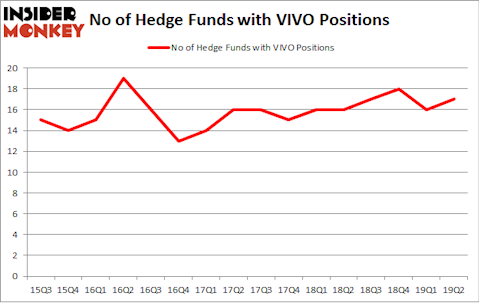Concerns over rising interest rates and expected further rate increases have hit several stocks hard during the fourth quarter of 2018. Trends reversed 180 degrees during the first half of 2019 amid Powell’s pivot and optimistic expectations towards a trade deal with China. Hedge funds and institutional investors tracked by Insider Monkey usually invest a disproportionate amount of their portfolios in smaller cap stocks. We have been receiving indications that hedge funds were increasing their overall exposure in the second quarter and this is one of the factors behind the recent movements in major indices. In this article, we will take a closer look at hedge fund sentiment towards Meridian Bioscience, Inc. (NASDAQ:VIVO).
Is Meridian Bioscience, Inc. (NASDAQ:VIVO) the right pick for your portfolio? Money managers are in an optimistic mood. The number of bullish hedge fund bets improved by 1 lately. Our calculations also showed that VIVO isn’t among the 30 most popular stocks among hedge funds (see the video below). VIVO was in 17 hedge funds’ portfolios at the end of the second quarter of 2019. There were 16 hedge funds in our database with VIVO positions at the end of the previous quarter.

Video: Click the image to watch our video about the top 5 most popular hedge fund stocks.
So, why do we pay attention to hedge fund sentiment before making any investment decisions? Our research has shown that hedge funds’ small-cap stock picks managed to beat the market by double digits annually between 1999 and 2016, but the margin of outperformance has been declining in recent years. Nevertheless, we were still able to identify in advance a select group of hedge fund holdings that outperformed the market by 40 percentage points since May 2014 through May 30, 2019 (see the details here). We were also able to identify in advance a select group of hedge fund holdings that underperformed the market by 10 percentage points annually between 2006 and 2017. Interestingly the margin of underperformance of these stocks has been increasing in recent years. Investors who are long the market and short these stocks would have returned more than 27% annually between 2015 and 2017. We have been tracking and sharing the list of these stocks since February 2017 in our quarterly newsletter. Even if you aren’t comfortable with shorting stocks, you should at least avoid initiating long positions in our short portfolio.

Unlike former hedge manager, Dr. Steve Sjuggerud, who is convinced Dow will soar past 40000, our long-short investment strategy doesn’t rely on bull markets to deliver double digit returns. We only rely on hedge fund buy/sell signals. We’re going to go over the key hedge fund action surrounding Meridian Bioscience, Inc. (NASDAQ:VIVO).
What does smart money think about Meridian Bioscience, Inc. (NASDAQ:VIVO)?
At the end of the second quarter, a total of 17 of the hedge funds tracked by Insider Monkey held long positions in this stock, a change of 6% from the previous quarter. By comparison, 16 hedge funds held shares or bullish call options in VIVO a year ago. So, let’s see which hedge funds were among the top holders of the stock and which hedge funds were making big moves.

More specifically, Renaissance Technologies was the largest shareholder of Meridian Bioscience, Inc. (NASDAQ:VIVO), with a stake worth $35.1 million reported as of the end of March. Trailing Renaissance Technologies was D E Shaw, which amassed a stake valued at $7.4 million. Marshall Wace LLP, GLG Partners, and Arrowstreet Capital were also very fond of the stock, giving the stock large weights in their portfolios.
As aggregate interest increased, some big names have been driving this bullishness. Winton Capital Management, managed by David Harding, created the biggest position in Meridian Bioscience, Inc. (NASDAQ:VIVO). Winton Capital Management had $0.3 million invested in the company at the end of the quarter. Minhua Zhang’s Weld Capital Management also initiated a $0.3 million position during the quarter. The following funds were also among the new VIVO investors: Benjamin A. Smith’s Laurion Capital Management and Gavin Saitowitz and Cisco J. del Valle’s Springbok Capital.
Let’s now take a look at hedge fund activity in other stocks similar to Meridian Bioscience, Inc. (NASDAQ:VIVO). We will take a look at Priority Technology Holdings, Inc. (NASDAQ:PRTH), Cowen Inc. (NASDAQ:COWN), Primo Water Corporation (NASDAQ:PRMW), and Barings BDC, Inc. (NYSE:BBDC). This group of stocks’ market valuations match VIVO’s market valuation.
| Ticker | No of HFs with positions | Total Value of HF Positions (x1000) | Change in HF Position |
|---|---|---|---|
| PRTH | 2 | 5077 | 0 |
| COWN | 19 | 76670 | -2 |
| PRMW | 12 | 108629 | -1 |
| BBDC | 13 | 31645 | 1 |
| Average | 11.5 | 55505 | -0.5 |
View table here if you experience formatting issues.
As you can see these stocks had an average of 11.5 hedge funds with bullish positions and the average amount invested in these stocks was $56 million. That figure was $61 million in VIVO’s case. Cowen Inc. (NASDAQ:COWN) is the most popular stock in this table. On the other hand Priority Technology Holdings, Inc. (NASDAQ:PRTH) is the least popular one with only 2 bullish hedge fund positions. Meridian Bioscience, Inc. (NASDAQ:VIVO) is not the most popular stock in this group but hedge fund interest is still above average. This is a slightly positive signal but we’d rather spend our time researching stocks that hedge funds are piling on. Our calculations showed that top 20 most popular stocks among hedge funds returned 24.4% in 2019 through September 30th and outperformed the S&P 500 ETF (SPY) by 4 percentage points. Unfortunately VIVO wasn’t nearly as popular as these 20 stocks and hedge funds that were betting on VIVO were disappointed as the stock returned -20.1% during the third quarter and underperformed the market. If you are interested in investing in large cap stocks with huge upside potential, you should check out the top 20 most popular stocks among hedge funds as many of these stocks already outperformed the market so far this year.
Disclosure: None. This article was originally published at Insider Monkey.





